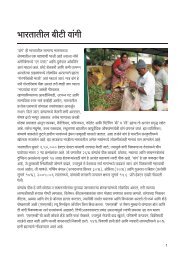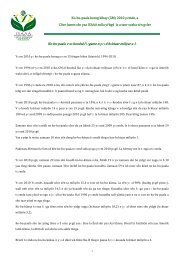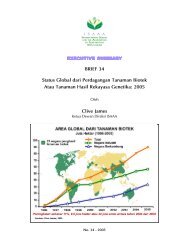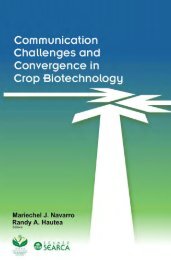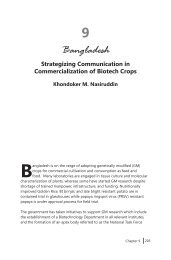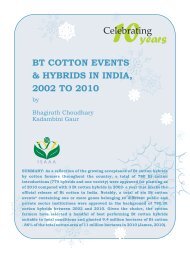Information Tug-of-War: Saga of Biotech Papaya 7 Agricultural - isaaa
Information Tug-of-War: Saga of Biotech Papaya 7 Agricultural - isaaa
Information Tug-of-War: Saga of Biotech Papaya 7 Agricultural - isaaa
Create successful ePaper yourself
Turn your PDF publications into a flip-book with our unique Google optimized e-Paper software.
<strong>Information</strong> <strong>Tug</strong>-<strong>of</strong>-<strong>War</strong>: <strong>Saga</strong> <strong>of</strong> <strong>Biotech</strong> <strong>Papaya</strong><br />
Mass media has been perceived as having “largely unbalanced reporting<br />
by enlarging the negative views while minimizing the positive views about<br />
modern biotechnology.” A 2005 survey by the <strong>Agricultural</strong> Economics Office<br />
showed that only 10% <strong>of</strong> journalists reported they had researched reference<br />
materials on biotechnology (USDA GAIN Report, 2009).<br />
Coverage <strong>of</strong> biotechnology has been generally episodal. Within a two-month<br />
period from August 25 to December 24, 2004, the Bangkok Post, a national<br />
English daily, followed the papaya story with 21 stories filed in September<br />
alone. On September 1, the newspaper reported that Prime Minister Thaksin<br />
“reversed his earlier decision to allow open field trials and commercial<br />
planting <strong>of</strong> GM crops, reportedly out <strong>of</strong> fear the issue would trigger social<br />
conflict.” The next day, he asked a committee to study the impact <strong>of</strong> GMOs.<br />
On Day 3, a German food distributor banned fruit cocktail products from a<br />
Thai exporter for fear the products contained GM papaya. This was followed<br />
by news on a delay or rejection by 10 fruit exports from Europe on processed<br />
papaya shipments fearing “contamination from GMOs.” The government<br />
warned that anyone growing GM crops or conducting open field trials would<br />
be severely punished while the DOA announced cleaning-up operations to<br />
tackle “possible contamination <strong>of</strong> plantations.” By September 15, Agriculture<br />
Minister Somsak Thepsuthin confirmed that a sample from Khon Kaen was<br />
tested positive by the DOA. On September 30, “farmers and consumer groups<br />
demanded the ouster <strong>of</strong> Thepsuthin for negligence in tackling the papaya<br />
issue” (Bangkok Post News and Archives, 2004).<br />
This observation was validated by a study on newspaper coverage <strong>of</strong> genetic<br />
modification events in Thailand (Xiang, 2007 as cited by Davidson, 2008).<br />
Results show that coverage <strong>of</strong> GE papaya was low from 2001 to 2002 but<br />
eventually increased during Greenpeace accusations against the DOA<br />
regarding alleged release <strong>of</strong> biotech papaya seeds from trial sites in 2004.<br />
Coverage decreased in 2005 when Greenpeace and DOA were in court<br />
hearings and picked up in 2007 when Greenpeace focused on efforts to<br />
prevent the cabinet from lifting the ban on field trials. Xiang (2007) also noted<br />
in a comparison with media coverage in China and the U.S., that the Thai<br />
press was more likely to have the most negative attitude towards GE crops<br />
and that they used Greenpeace as sources <strong>of</strong> information. Juanillo (2003)<br />
confirms this observation when he says that Thai journalists have a high<br />
Chapter 7 173



